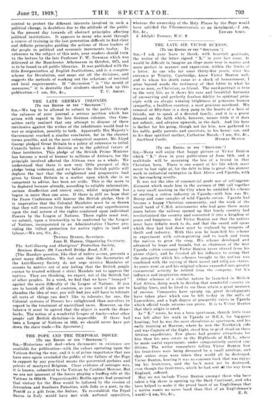[To THE EDITOR OF THE " SPECTATOR. " ] SIR,—Many will enjoy
that happy picture of Victor Buxton which " X." drew in your publication of June 14th, and a multitude will be mourning the loss of a friend in that Christian hero. There is one aspect of his life which must never be lost sight of, for the debt to him is great—his pioneer work in industrial enterprise in East Africa and Uganda, with its far-reaching results.
It was not the idea of commercial profit nor of self-aggran- disement which made him in the autumn of 1901 call together a very small meeting in the City when he unfolded his scheme of starting a cotton industry in Uganda—with him was Mr. Borup and some samples of wild Uganda cotton. Uganda had become a happy Christian community, and the work of the small band of C.M.S. missionaries who had gone there many years before the railway opened up that lonely country had revolutionized the country and converted it into a kingdom of peace and happiness. But Victor Buxton saw that the natives must have definite work to do, and that the sword add spear which they had laid down must be replaced by weapons of thrift and industry. With this aim he launched his scheme to experiment with cotton-growing and to teach and train the natives to grow the crop. His scheme developed and advanced by leaps and bounds, but as chairman of the first Uganda cotton company Victor Buxton never stifled front his prime object, and lie eevoted all his influence to seeing that the prosperity which his schemes brought to the natives was combined with the raising of their moral and religious status. As years went on and his original scheme expanded into greater commercial activity he retired from the company, but h's influence and inspiration remain.
Other scheines of a similar nature he launched in Tiritir-h East Africa, doing much to develop that wonderful country on healthy lines, and he lived to see them attain a great measure of success. Companies have sprung up, great developments have taken place which can be felt to-day in the mils of Lancashire, and a high degree of prosperity exists in tganda which official trade returns can prove. It is to Victor Buxton that their origin-is owed.
As " X." wrote, he was a born sportsman, though little time was left after his work in Uganda or B.E.A. for big-game hunting; but he was the most chivalrous of sportsmen, and his early training at Harrow, where he won the Northwick rifle and was Captain of the Eight, stood him in geed stead on these African expeditions. Few places had greater attractions for him than his own estate in the Highlands of B.E.A., where lie made useful experiments under comparatively untried con- ditions. The writer remembers telling Victor Buxton how his fruit-trees were being devoured by a small antelope, and that unless steps were taken they would all be destroyed. Victor Burton, hearing it was no common buck that was enjoy- ing his fruit-trees, said the buck must not be destroyed, even though the fruit-trees, which he had sent ail the way front England, suffered.
May we not include Victor Buxton amongst those who have taken a big share in opening up the Dark Continent, and who have helped to make it the proud boast of an Englishman that a native wants no surer bond than that of an Englishman's






































 Previous page
Previous page